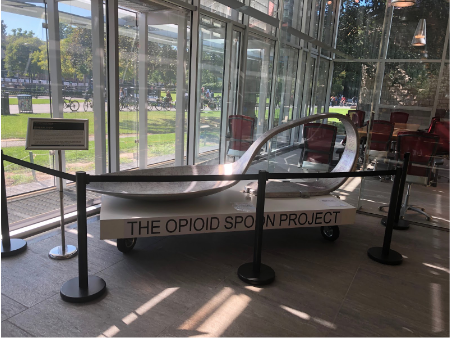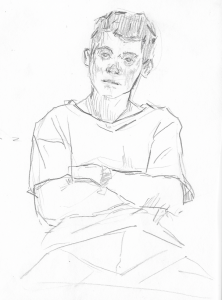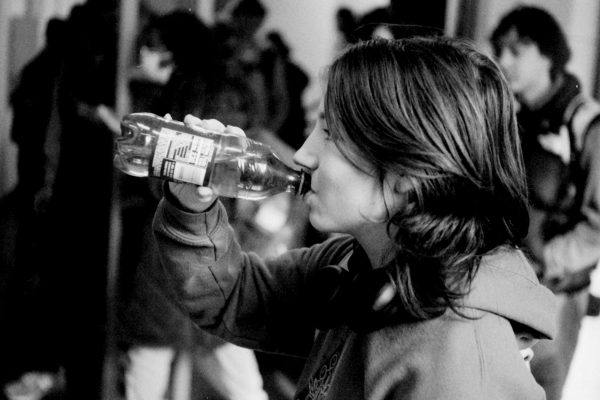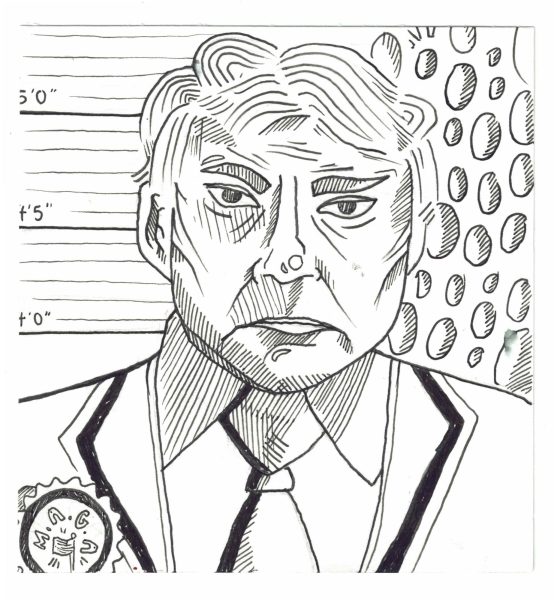The Opioid Spoon Project

The bent spoon on display at the Cambridge Public Library’s main branch.
November 7, 2019
According to the United States Center for Disease Control (CDC), 48,000 Americans died from opioid overdoses in 2017. This represents a sixfold increase in deaths since 1999, mainly as a result of an increase in people who became addicted to heroin and fentanyl after being prescribed opioids like Oxycontin for chronic pain. Many Americans have put the blame at the feet of pharmaceutical companies for the opioid crisis, accusing them of encouraging doctors to overprescribe opioids and downplaying the potential for addiction. The magnitude of the opioid epidemic has sparked a nationwide debate over the best response to a crisis that kills more than four times as many Americans annually as gun homicides.
In an effort to boost awareness of the epidemic, Boston-based artist/activist Domenic Esposito, who has experienced addiction in his family, created an 800-pound sculpture of a spoon that would be used to “cook” heroin. The sculpture, under the banner of Esposito’s “The Opioid Spoon Project”, was displayed at the Cambridge Public Library from September 16th to September 30th as part of National Recovery Month, which is a nationwide effort to increase understanding of mental and substance abuse disorders. Local resident and CRLS parent Julia Moore told the Register Forum, “I admire the guy who started it; he was so upfront about his personal experience with the epidemic. It takes great courage to do that. It’s a great thing that he’s doing.”
The opioid spoon was in Cambridge earlier this year for an event sponsored by Mayor Marc McGovern encouraging residents to write the names of loved ones lost to the epidemic on the Spoon, part of a series of such events put on by the Opioid Spoon Project in an effort to show the human impact of the crisis.
Cambridge Mayor Marc Mcgovern also co-sponsored the display of the opioid spoon at the library. McGovern tweeted an invitation for people to join him at the public library for the unveiling of the display on September 16th, saying, “We need to act and this spoon is a reminder of that responsibility.” Massachusetts as a whole saw 1,649 opioid overdose deaths in 2017. Although Cambridge’s opioid death rate was lower than that of Middlesex County, and Massachusetts as a whole, it spiked up in 2016 to 23.5 deaths per 100,000 residents, just below the county average of 26.2. According to the Cambridge Public Health Department, there were 27 fatal opioid overdoses in the city in 2016. Professional EMS responded to 238 opioid overdoses in Cambridge in 2017.
In the face of these disturbing statistics, the Cambridge community has been very supportive of the project—dozens signed the sculpture when it passed through the city last spring. CRLS senior Louis Pardo spoke to the fact that many opioid addicts start using at a young age, often after being prescribed drugs for surgeries or sports injuries. Pardo said, “There needs to be more awareness of the issue, especially among teenagers who are likely to be affected by it.”
Community members made clear that they appreciate how much the project raises awareness of the opioid epidemic. Sophomore Imran Hussain said that he “wasn’t aware of the impact that opioids have on our community, but this project made me learn more about it.” Cambridge resident and Beth Israel ER doctor Caleb Dresser said he is “a bit concerned that this vivid installation may serve as a trigger for those in recovery” but he says, the sculpture “is also a powerful message about how large this issue now looms in our community.”
According to the United States Center for Disease Control (CDC), 48,000 Americans died from opioid overdoses in 2017, a sixfold increase in opioid related deaths since 1999. Most of this increase can be attributed to the larger number of people who have become addicted to heroin and fentanyl after being prescribed opioids like Oxycontin for chronic pain. Many Americans have blamed pharmaceutical companies for the opioid crisis, accusing them of encouraging doctors to overprescribe opioids and downplaying the potential for addiction. The magnitude of the opioid epidemic has sparked a nationwide debate over the best response to a crisis that kills more than four times as many Americans annually as gun homicides.
In an effort to boost awareness of the epidemic, Boston-based artist and activist Domenic Esposito, whose family has experienced opioid addiction, created an 800-pound sculpture of the kind of spoon that would be used to “cook” heroin. The sculpture, which is under the banner of Esposito’s The Opioid Spoon Project, was displayed at the Cambridge Public Library from September 16th to September 30th as part of National Recovery Month, which is a nationwide effort to increase understanding of mental and substance abuse disorders. Local resident and CRLS parent Julia Moore told the Register Forum, “I admire the guy who started it; he was so upfront about his personal experience with the epidemic. It takes great courage to do that. It’s a great thing that he’s doing.”
The opioid spoon was in Cambridge earlier this year for an event sponsored by Mayor Marc McGovern encouraging residents to write the names of loved ones lost to the epidemic on the sculpture, part of a series of such events put on by The Opioid Spoon Project in an effort to show the human impact of the crisis.
Mayor Marc Mcgovern also co-sponsored the display of the opioid spoon at the library. McGovern tweeted an invitation for people to join him at the public library for the unveiling of the display on September 16th, saying, “We need to act and this spoon is a reminder of that responsibility.” Massachusetts as a whole saw 1,649 opioid overdose deaths in 2017. Although Cambridge’s opioid death rate was lower than most of Middlesex County and Massachusetts as a whole, it spiked in 2016 to 23.5 deaths per 100,000 residents, just below the county average of 26.2. According to the Cambridge Public Health Department, there were 27 fatal opioid overdoses in the city in 2016. Professional Emergency Medical Technicians responded to 238 opioid overdoses in Cambridge in 2017.
In the face of these disturbing statistics, the Cambridge community has been very supportive of the project—dozens signed the sculpture when it passed through the city last spring. CRLS senior Louis Pardo spoke to the fact that many opioid addicts start using at a young age, often after being prescribed drugs for surgeries or sports injuries. Pardo said, “There needs to be more awareness of the issue, especially among teenagers who are likely to be affected by it.”
Community members made clear that they appreciate how much the project raises awareness of the opioid epidemic. Sophomore Imran Hussain said that he “wasn’t aware of the impact that opioids have on our community, but this project made me learn more about it.” Cambridge resident and Beth Israel ER doctor Caleb Dresser said he is “a bit concerned that this vivid installation may serve as a trigger for those in recovery” but he said, the sculpture “is also a powerful message about how large this issue now looms in our community.”
This piece also appears in our October 2019 print edition.









